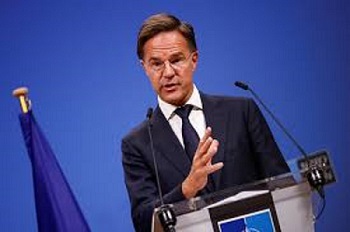NATO To Hold Annual Nuclear Drill From Monday
NATO will begin its annual nuclear exercise on Monday, alliance Secretary-General, Mark Rutte said, against a backdrop of heightened nuclear rhetoric from Russian President Vladimir Putin.
F-35A fighter jets and B-52 bombers will be among some 60 aircraft from 13 nations taking part in the Steadfast Noon exercise, hosted by Belgium and The Netherlands, NATO officials said.
“In an uncertain world it is vital that we test our defence and that we strengthen our defence so that our adversaries know that NATO is ready, and is able to respond to any threat,” Rutte said in London following meetings with Prime Minister, Keir Starmer and Ukrainian President, Volodymyr Zelenskiy.
“The whole exercise will particularly focus on the United Kingdom, the North Sea, but also Belgium and the Netherlands,” he added.
The exercise does not use any live weapons. But some 2,000 military personnel taking part in the drills will simulate missions in which warplanes carry US nuclear warheads, officials said.
The exercise will start on Monday and last for about two weeks, according to officials from the 32-member transatlantic military alliance.
Putin has repeatedly warned the West of potential nuclear consequences since Russia’s 2022 full-scale invasion of Ukraine.
He declared last month that Russia could use nuclear weapons if it was struck with conventional missiles, and that Moscow would consider any assault on it supported by a nuclear power to be a joint attack.
Meanwhile, NATO officials stressed its exercise was not a response to any recent declarations from Moscow and that the drills had taken place annually for more than a decade.
“We don’t adjust constantly according to whatever is being said or not said on any given day,” said Angus Lapsley, NATO’s assistant secretary general for defence policy and planning.
However, he said exercises such as Steadfast Noon were important to demonstrate NATO’s nuclear capabilities and deter against any attack.
“We seek to deter any adversaries, and principally Russia, in several different ways, including conventional deterrence,” he told reporters at NATO headquarters in Brussels. “But it’s always been underpinned by nuclear deterrence.”
Lapsley said NATO was currently very focused on making sure its nuclear deterrence was credible and assured.
REUTERS/Christopher Ojilere



Comments are closed.